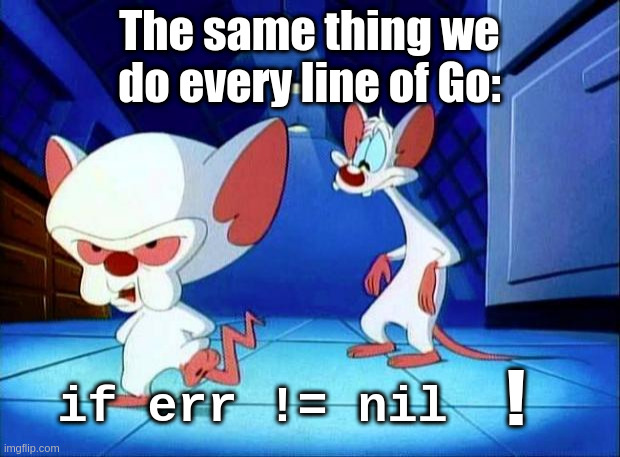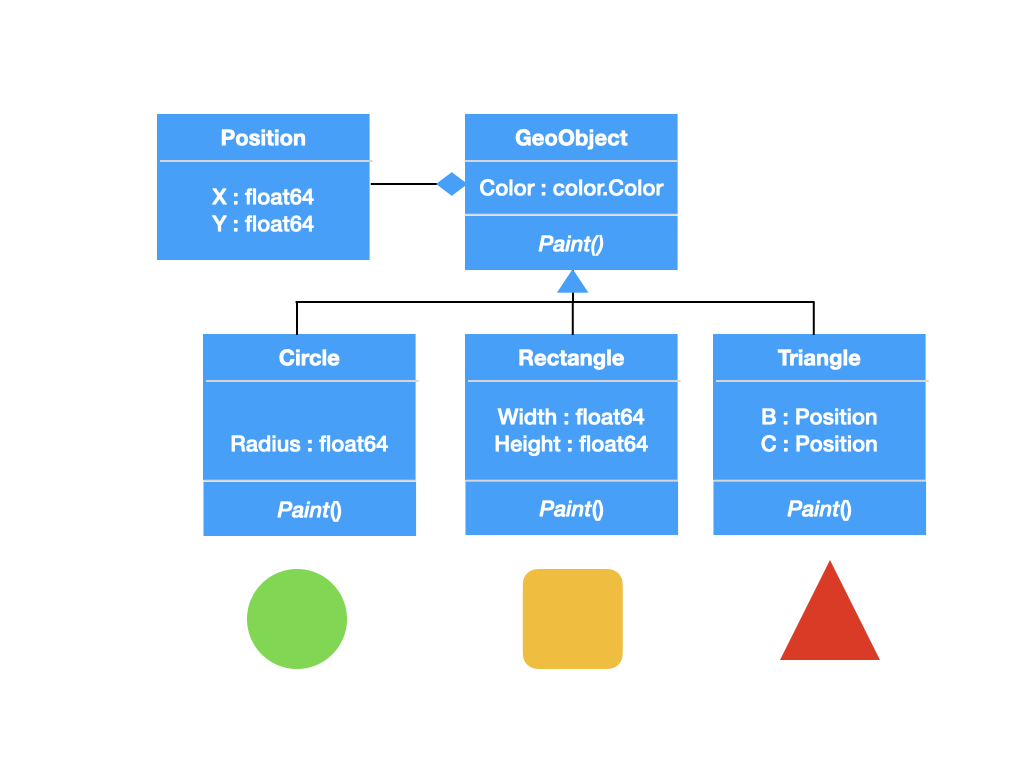Go Programming - OOP
Concepts of Programming Languages
Sebastian Macke
Rosenheim Technical University
Sebastian Macke
Rosenheim Technical University

Go doesn't have try-catch exception based error handling.
Go distinguishes between recoverable and unrecoverable errors:
Recoverable: e. g. file not found
err := ioutil.WriteFile(src.Name(), []byte("hello"), 0644)
if err != nil {
log.Error(err)
}Unrecoverable: array access outside its boundaries, out of memory
5The "defer" statement lets us ensure that code runs before a function exits
f, err := os.Open("myfile.txt")
if err != nil {
return err
}
defer f.Close() // Will be executed on function exit, even in case of an unrecoverable error.
....
// read, writefunc getElement(array []int, index int) int { if index >= len(array) { panic("Out of bounds") } return array[index] } func getElementWithRecover(array []int, index int) (value int) { defer func() { r := recover() if r != nil { fmt.Println("Recovered with message '", r, "'") } value = -1 }() return getElement(array, index) } func main() { array := []int{3, 4, 5} ret := getElementWithRecover(array, 3) fmt.Println("return value: ", ret) }
Wikipedia: Object-oriented programming (OOP) is a programming paradigm based on the concept of "objects", which can contain data and code: data in the form of fields (often known as attributes or properties), and code, in the form of procedures (often known as methods).
Go is not a pure object oriented programming language but
allows an object-oriented style of programming
// Rational represents a rational number numerator/denominator. type Rational struct { numerator int denominator int } // Constructor func NewRational(numerator int, denominator int) Rational { if denominator == 0 { panic("division by zero") } return Rational{ numerator: numerator, denominator: denominator, } }
// Multiply method for rational numbers
func Multiply(r Rational, y Rational) Rational {
return NewRational(r.numerator*y.numerator, r.denominator*y.denominator)
}// Multiply method for rational numbers
func (r *Rational) Multiply(y Rational) Rational {
return NewRational(r.numerator*y.numerator, r.denominator*y.denominator)
}
r1 := NewRational(1, 2)
r2 := NewRational(2, 4)
r3 := r1.Multiply(r2)The variable r is in both cases similar to the Java this, which reference to the class instance
13package main import "fmt" type MyInt int func (b *MyInt) Inc() { *b = *b + 1 } func main() { var b MyInt = 10 fmt.Println(b) b.Inc() fmt.Println(b) }
package main import "fmt" type Bar struct{} func (b *Bar) GetHello() string { fmt.Println(b) return "Hello" } type Foo struct { B *Bar } func main() { var f Foo fmt.Println(f.B) // Output "nil" fmt.Println(f.B.GetHello()) // Null Pointer error or "Hello"? }
Encapsulation of methods is basically is just a syntax element.
func (r *Rational) Multiply(y Rational) Rational {
....
}is internally transformed into
func Multiply(r *Rational, y Rational) Rational {
....
}A lot of languages do it this way.
16Composition and inheritance are two ways to achieve code reuse and design modular systems
class Engine {
....
}
class Car {
private Engine engine
}class Animal {
....
}
class Dog extends Animal {
}Composition and inheritance are two ways to achieve code reuse and design modular systems
www.youtube.com/watch?v=Ng8m5VXsn8Q&t=414s
class Runner {
public void run(Task task) { task.run(); }
public void runAll(List<Task> tasks) { for (Task task : tasks) { run(task); } }
}
class RunCounter extends Runner {
private int count = 0;
@override public void run(Task task) {
count++;
super.run(task);
}
@override public void runAll(List<Task> tasks) {
count += tasks.size();
super.runAll(tasks);
}
}When I run 3 tasks with RunCounter.runAll, what value does count have?
19// Point is a two dimensional point in a cartesian coordinate system. type Point struct{ x, y int }
// ColorPoint extends Point by adding a color field. type ColorPoint struct { Point // Embedding simulates inheritance but it is (sort-of) delegation! c int }
fmt.Println(cp.x) // access inherited field
// Point is a two dimensional point in a cartesian coordinate system.
type Point struct{ x, y int }
// ColorPoint extends Point by adding a color field.
type ColorPoint struct {
Point // Embedding simulates inheritance but it is (sort-of) delegation!
c int
}
var Point p = Point{}
var ColorPoint cp = ColorPoint{}
p = cp // Compile Error
p = cp.Point // WorksAn interface is a set of methods
In Java:
interface Switch {
void open();
void close();
}In Go:
type OpenCloser interface {
Open()
Close()
}class Door implements Switch {
public void Open() { ... }
public void Close() { ... }
}type Door struct {}
func (d *Door) Open() { ... }
func (d *Door) Close() { ... }Door implicitly satisfies the interface OpenCloser
Go supports polymorphism only via interfaces
25The print functions in the fmt package support the following interface
type Stringer interface {
String() string
}if tmp, ok := object.(Stringer); ok {
// The object implements stringer
}package main import "fmt" type DoorOpen bool func (d DoorOpen) String() string { if d == true { return "Door is open" } else { return "Door is closed" } } func main() { var d DoorOpen = false fmt.Println(d) }
An implementation can support multiple interfaces at the same time.
27func main() { var p = Point{1, 2} var cp = ColorPoint{p, 3} // embeds Point fmt.Println(p) fmt.Println(cp) fmt.Println(cp.x) // access inherited field // s is an interface and supports Polymorphism var s fmt.Stringer s = p // check at compile time fmt.Println(s) s = cp fmt.Println(s) }
func main() { var someValue any someValue = 2 PrintVariableDetails(someValue) someValue = "abcd" PrintVariableDetails(someValue) if tmp, ok := someValue.(string); ok { fmt.Println("someValue is a string and has the value", tmp) } }
type any = interface{}* The error interface
func divide(a, b int) (int, error) { if b == 0 { return 0, errors.New("division by zero") } return a / b, nil } func main() { // Successful division result, err := divide(10, 0) if err != nil { fmt.Println("Error:", err) } else { fmt.Println("Result:", result) } }
The error is just an interface with one method that should return the error message:
type error interface {
Error() string
}
github.com/s-macke/concepts-of-programming-languages/blob/master/docs/exercises/Exercise3.md
32type Foo struct { Name string } type Bar struct { Name string } type X struct { Foo Bar } func main() { y := X{ Foo: Foo{Name: "Foo!"}, Bar: Bar{Name: "Bar!"}, } fmt.Print(y.Foo.Name) fmt.Print(y.Bar.Name) //fmt.Print(y.Name) // compile error, Ambiguous Reference }